

Exquisite Minds: Gifted and Creative Children « Support for Educators and Parents of Gifted and Creative Children "The problems that exist in the world today cannot be solved by the level of thinking that cr. Nature and Needs of Gifted Learners. The Nature Of Genius. Genius by L.
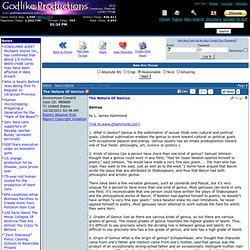
James Hammond [link to www.ljhammond.com] 1. What is Genius? 2. There have been a few versatile geniuses, such as Leonardo and Pascal, but it’s very unusual for a person to have more than one kind of genius. 3. 4. Many geniuses emerged from families that had been successful in practical affairs, and then had declined in vigor and strength. Unlocking the Mysteries of The Artistic Mind. Consider the flightless fluffs of brown otherwise known as herring gull chicks.
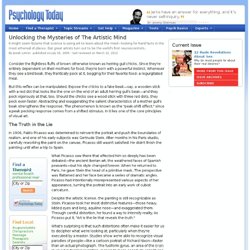
Since they're entirely dependent on their mothers for food, they're born with a powerful instinct. Whenever they see a bird beak, they frantically peck at it, begging for their favorite food: a regurgitated meal. But this reflex can be manipulated. Expose the chicks to a fake beak—say, a wooden stick with a red dot that looks like the one on the end of an adult herring gull's beak—and they peck vigorously at that, too. Should the chicks see a wood stick with three red dots, they peck even faster. The Truth in the Lie In 1906, Pablo Picasso was determined to reinvent the portrait and push the boundaries of realism, and one of his early subjects was Gertrude Stein.
What Picasso saw there that affected him so deeply has been debated—the ancient Iberian art, the weathered faces of Spanish peasants—but his style changed forever. Despite the artistic license, the painting is still recognizable as Stein. Thinking like a genius: overview. Thinking and recall series Problem solving: creative solutions "Even if you're not a genius, you can use the same strategies as Aristotle and Einstein to harness the power of your creative mind and better manage your future.
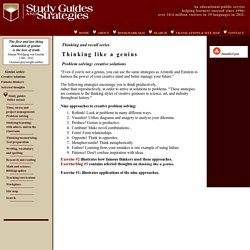
" The following strategies encourage you to think productively, rather than reproductively, in order to arrive at solutions to problems. "These strategies are common to the thinking styles of creative geniuses in science, art, and industry throughout history. " Nine approaches to creative problem solving: Rethink! Exercise #2 illustrates how famous thinkers used these approaches. Thinking like a genius: selected thoughts. Paternal Influence on Gifted Males. Hammond, D.R., Hébert, T.P., & Pagnani, A.R.
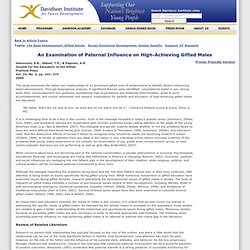
Journal for the Education of the Gifted Prufrock Press Vol. 33, No. 2, pp. 241–274 2009. Understanding Giftedness. Who are the Gifted?
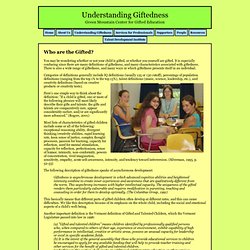
You may be wondering whether or not your child is gifted, or whether you yourself are gifted. It is especially confusing since there are many definitions of giftedness, and many characteristics associated with giftedness. There is also a wide range of giftedness, and many ways in which giftedness presents itself in an individual. Categories of definitions generally include IQ definitions (usually 125 or 130 cutoff), percentage of population definitions (ranging from the top 1% to the top 15%), talent definitions (music, science, leadership, etc. and creativity definitions (based on creative products or creativity tests). Gender and Genius. Kerr, B.
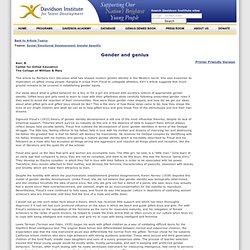
Center for Gifted Education The College of William & Mary This article by Barbara Kerr discusses what has shaped modern gender identity in the Western world. She also examines its implication on gifted young people. Ranging in scope from Freud to collegiate athletics, Kerr's article suggests that much ground remains to be covered in establishing gender equity. Creativity across the life-span: A systems view.
Csikszentmihalyi, M.
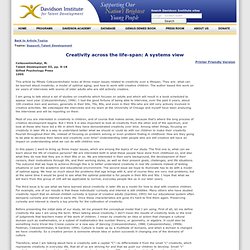
Talent Development III, pp. 9-18 Gifted Psychology Press 1995 This article by Mihaly Csikszentmihalyi looks at three major issues related to creativity over a lifespan. They are: what can be learned about creativity; a model of optimal aging; and how to work with creative children. The author based this work on six years of interviews with scores of older adults who are still actively creative. I am going to talk about a set of studies on creativity which focuses on adults and which will result in a book scheduled to appear next year (Csikszentmihalyi, 1996). The Self-Education of Gifted Adults. The Self-Education of Gifted Adults Author: Lisa Rivero Citation: First published in the SENGVine, Gifted Adult edition, January 2012 “Somewhere along the line of development we discover what we really are and then make our real decision for which we are responsible.
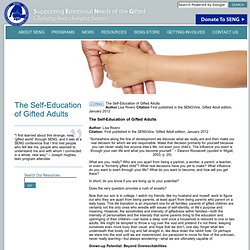
Make that decision primarily for yourself because you can never really live anyone else’s life, not even your child’s. The influence you exert is through your own life and what you become yourself.” ~ Eleanor Roosevelt (quoted in Wigall, 2003, p. 29) What are you, really? In short, do you know if you are living up to your potential? Does the very question provoke a rush of anxiety? Discovering the gifted ex-child. Discovering the Gifted Ex-Child.
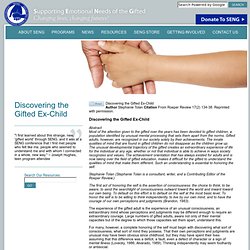
Fostering adult giftedness: Acknowledging and addressing affective needs of gifted adults. Fostering Adult Giftedness: Acknowledging and Addressing Affective Needs of Gifted Adults Recently I had the pleasure of participating in an Internet conference with parents in Australia about the social and emotional needs of gifted children.
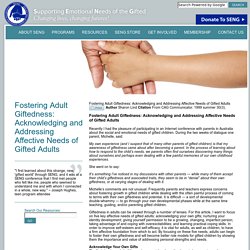
During the two weeks of dialogue one parent, Michelle, said: Can You Hear the Flowers Sing? Issues for Gifted Adults. Can You Hear the Flowers Sing? Issues for Gifted Adults Author: Deirdre V. Lovecky Citation: Copyright © American Counseling Association. How to Charm Gifted Adults into Admitting Giftedness: Their Own and Somebody Else’s. The Loneliness of Being Misinformed about Giftedness In my current experience and view, the biggest “social issue of the gifted” is the painful misfit between implicit beliefs about giftedness by the non-gifted and the gifted alike and the actual or perceived reality of very many gifted adults. That misfit leads to utter loneliness: It impedes the sharing of one’s deep feelings and experiences related to giftedness with others because of the belief that these have nothing to do with being gifted. It also leads to avoiding calling oneself gifted – even if the direct question is asked – because of strong inner convictions about not qualifying for that seemingly outstanding state of being.
I feel this is strongly connected to the dominant belief that for adults their giftedness is defined by actual eminent achievement, with the tacit assumption that only something like a Nobel Prize will be sufficient proof of eminence. Gifted Adults and Politics. The intellectual and psychosocial nature of extreme giftedness. Powell, P. & Haden, T. Roeper Review Volume 6, No. 3, pp. 131--133 February 1984. Intellectual Giftedness. Intellectual giftedness, often referred to as high IQ, is usually given short shrift when it comes to considerations of the special needs of exceptional people.
Because giftedness appears on the surface to be nothing but an advantage, the challenges it presents are often ignored and unknown. Giftedness is not about being better, it's about being *different*. A gifted person's life experience is significantly different from the norm. Along with it's blessings, it brings it's own set of challenges. Feelings of extreme isolation are fairly common, while introversion and emotional intensity conspire to keep others at bay. I'm of the opinion that, despite our desire for simple quantification of intelligence, noting characteristics of giftedness is perhaps a more useful, or at least complementary, method of detecting the intelligent.
Almost all those characteristics, while pretty general, are present in every really smart person I know. Profiles of the Gifted & Talented.